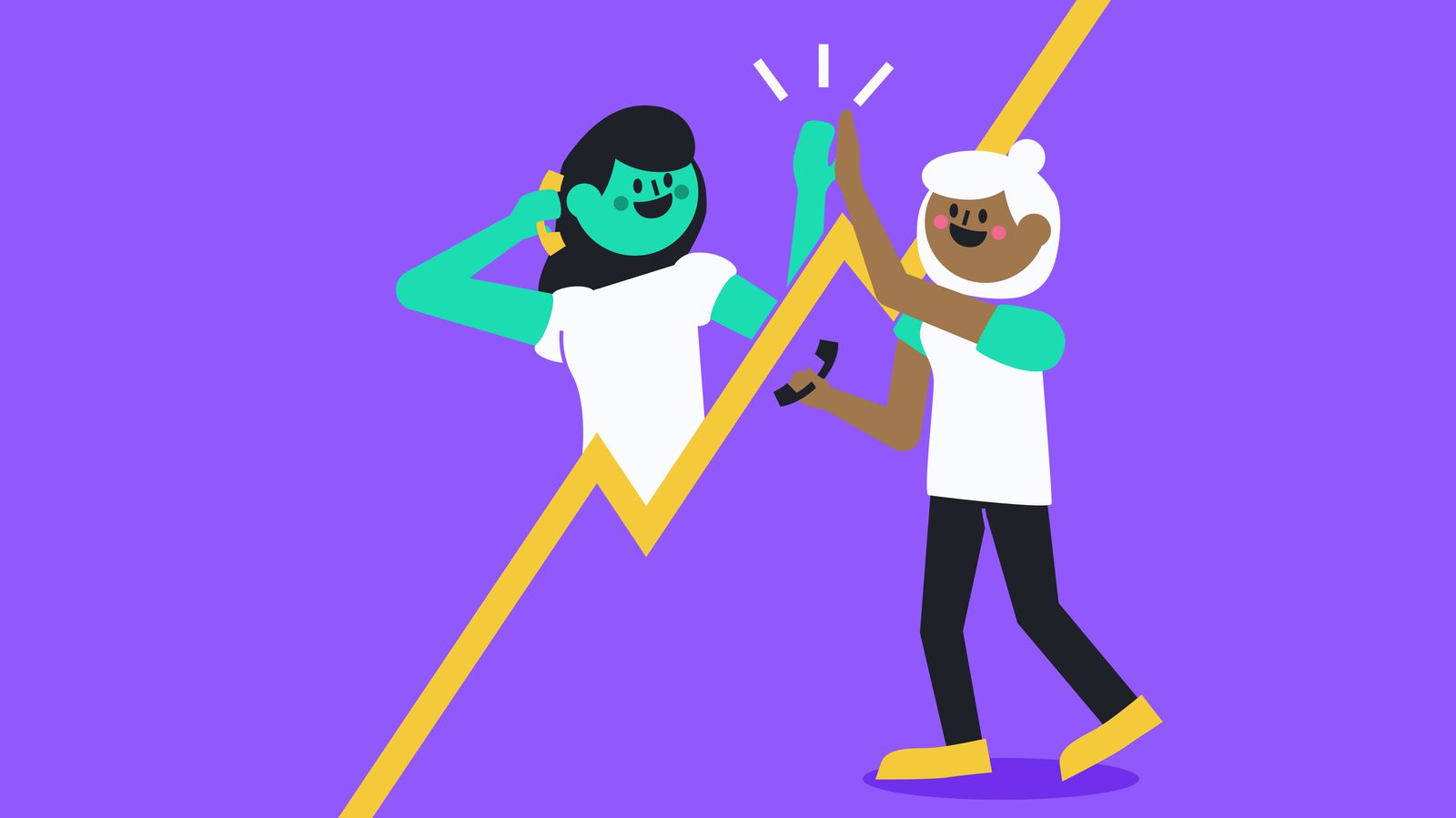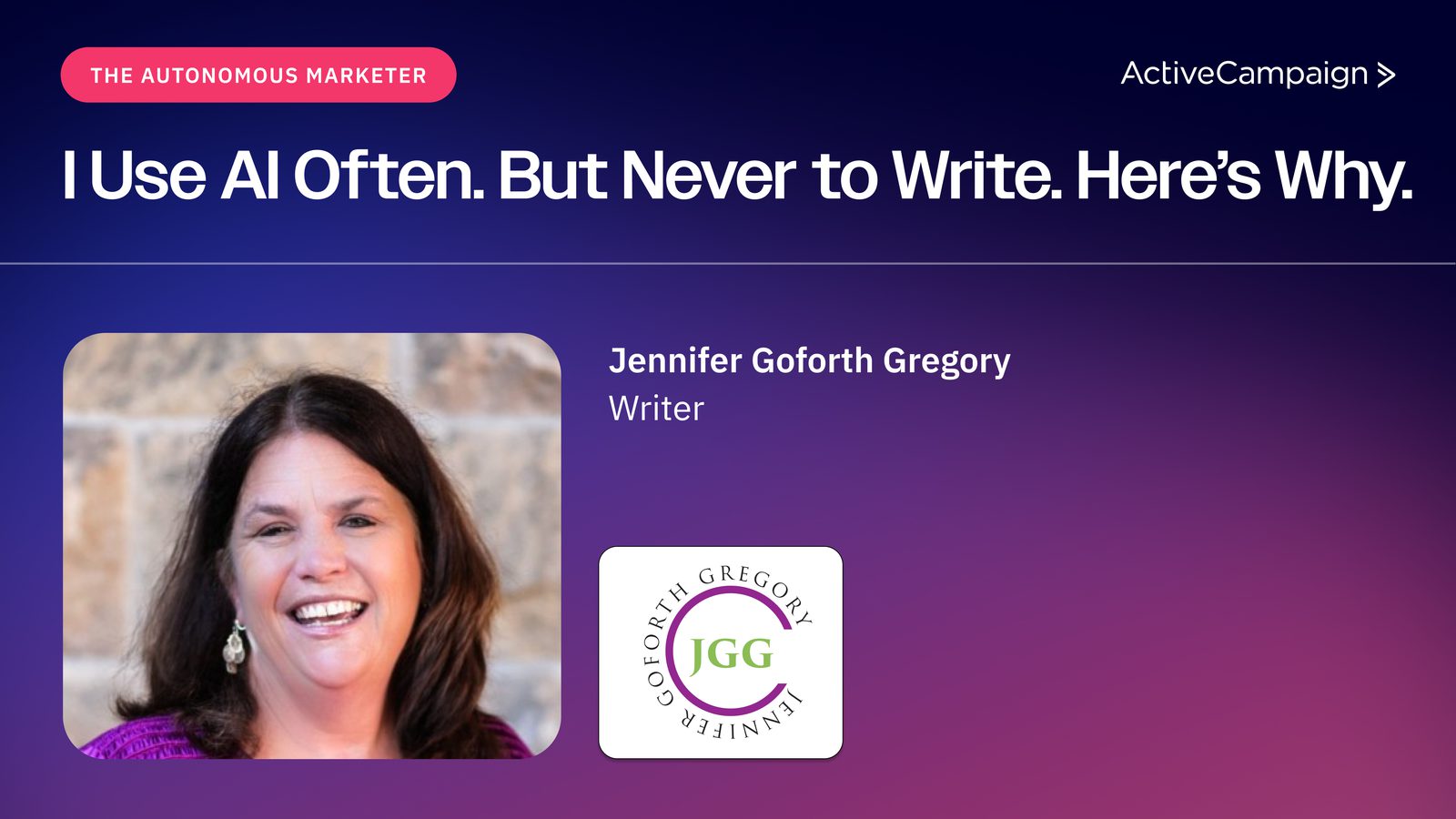Social distancing, self-isolation, and quarantines are keeping us physically apart during an uncertain, tumultuous time.
Still, that hasn’t stopped people from (figuratively) coming together in support of their neighbors and local businesses.
Here are 8 ways people are supporting their communities in the face of the COVID-19 crisis:
- Creating resources to help local service industry workers
- Connecting freelancers and artists with work and support
- Building databases of local restaurants offering delivery and takeout
- Fundraising with cool merch
- Sharing what they have
- Volunteering their time
- Offering free classes on almost everything
- Making music with and for each other
1. Creating resources to help local service industry workers
When times are hard, many people want to help their communities — but aren’t sure where to start.
To help point people in the right direction, community members are creating resources of ways to support local businesses and people in the service industry. The service industry has been hit especially hard by mandated closures, leaving many people in the service industry without reliable income.
The Chicago Service Relief directory is a “directory of fundraisers for Chicago bars, venues, and restaurants that can use our help to support their staff during the state-mandated shutdown" created by Spencer Tweedy.
Chicagoan (and ActiveCampaigner!) Kelly O'Connell created the Chicago Fundraisers for Service Industry spreadsheet to help Chicagoans find the fundraising links for their favorite restaurants and bars. The spreadsheet also shows how close each spot is to reaching its fundraising goal:
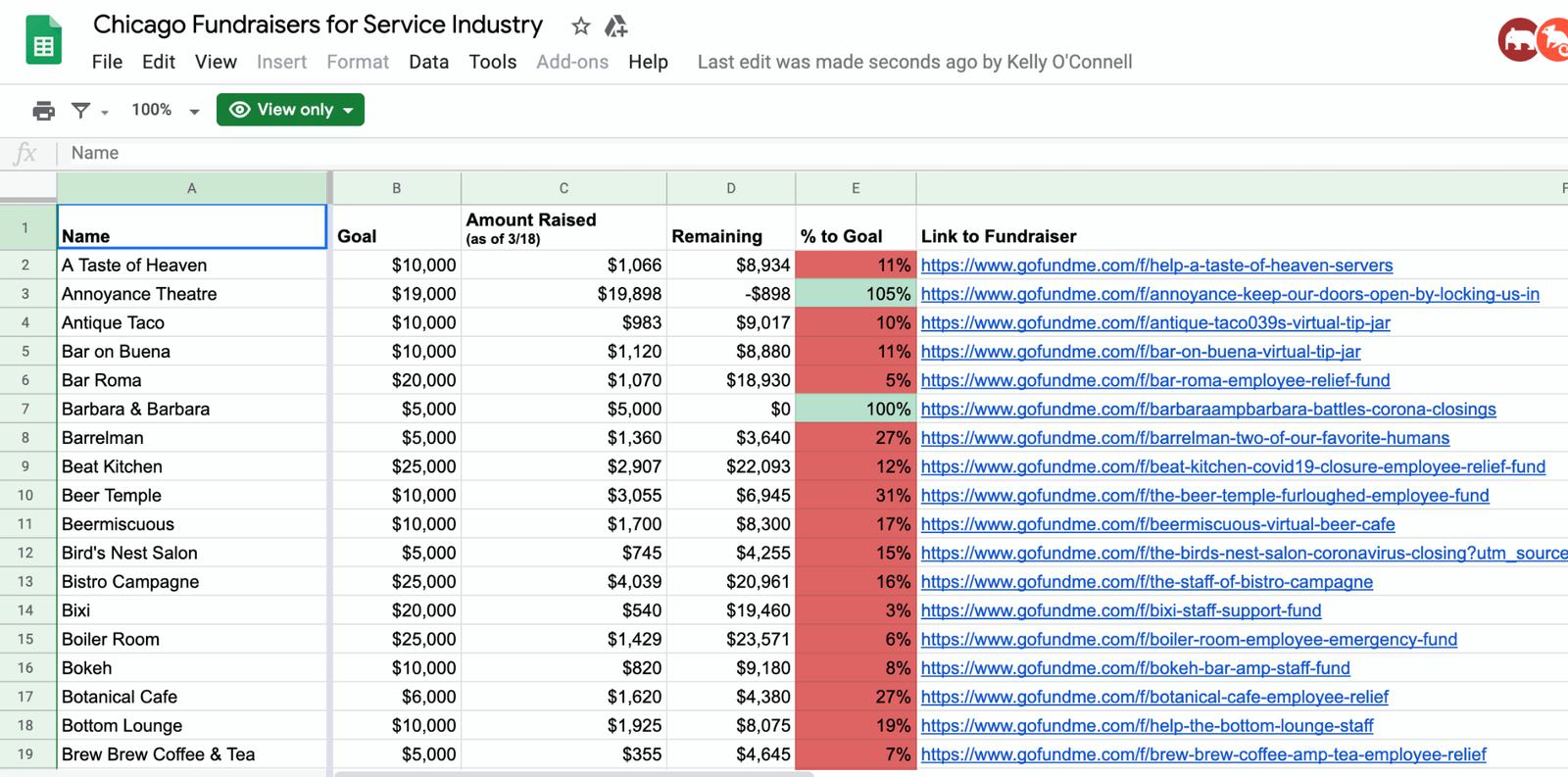
(Source: Chicago Fundraisers for Service Industry)
You can check out a mobile app version of the fundraiser directory here.
2. Connecting freelancers and artists with work and support
Freelancers and artists face some of the hardest economic impacts during this time. To help, people have put together resources to connect artists and freelancers with both work and economic support.
Michael King, Founder of iPullRank, is building a database to connect digital freelancers who recently lost their gigs to agencies and other businesses looking to hire:
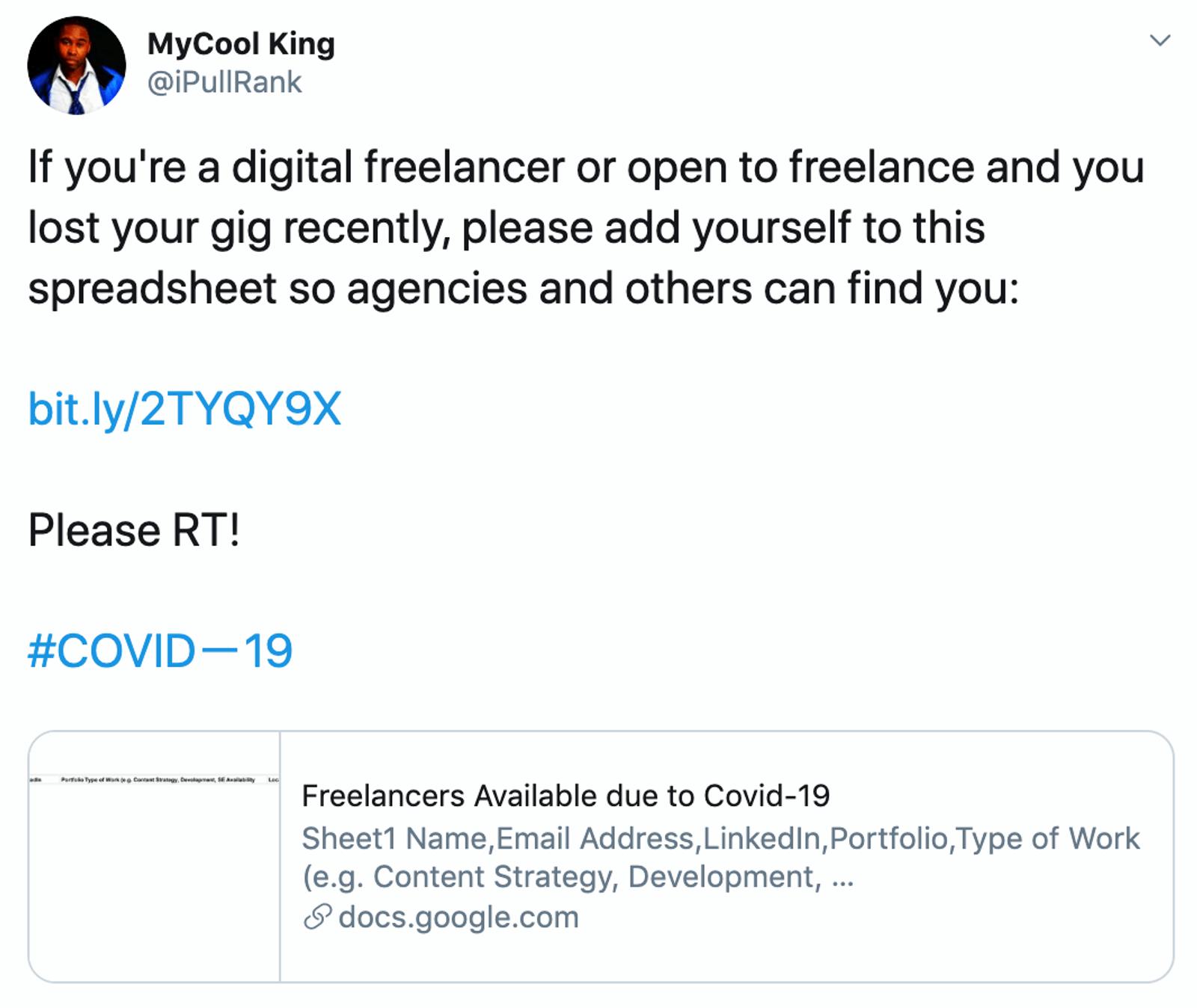
(Source: Twitter)
On the flip side of that initiative, SEO professional Lily Ray launched a project to match digital marketers with business owners in need of “immediate and free support in the form of consulting, strategy, or execution of digital marketing services.”
If marketers are in a position to offer pro-bono services, Lily will match them to businesses in need.
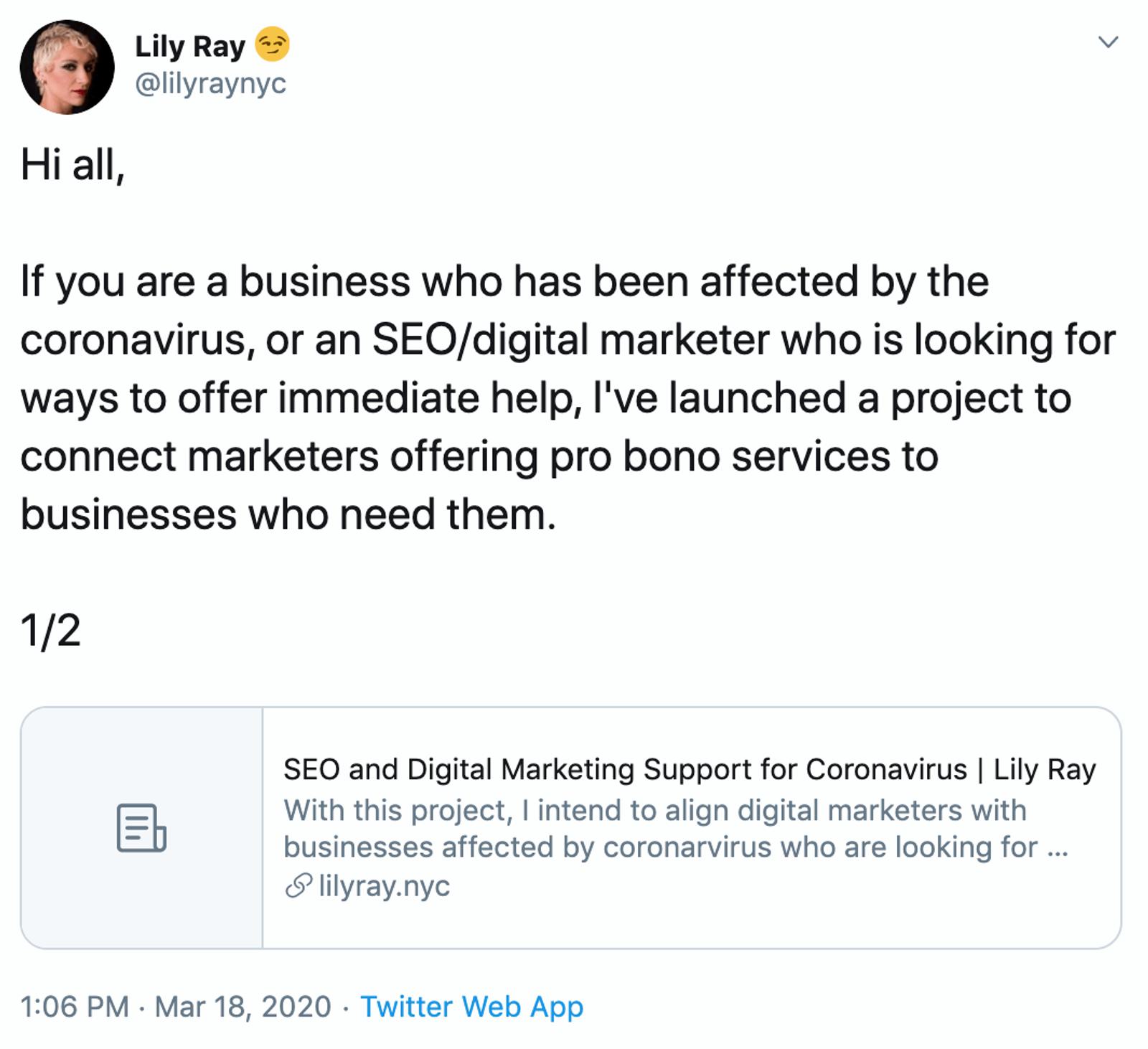
(Source: Twitter)
Arts collective P0STB1NARY created a “directory of independent artists whose livelihoods are impacted due to event cancellations/COVID-19.” Many of the artists in the directory accept commissions and/or sell their art online. Supporters can check out the artists' work, commission them, and donate directly to them via the information on the spreadsheet.
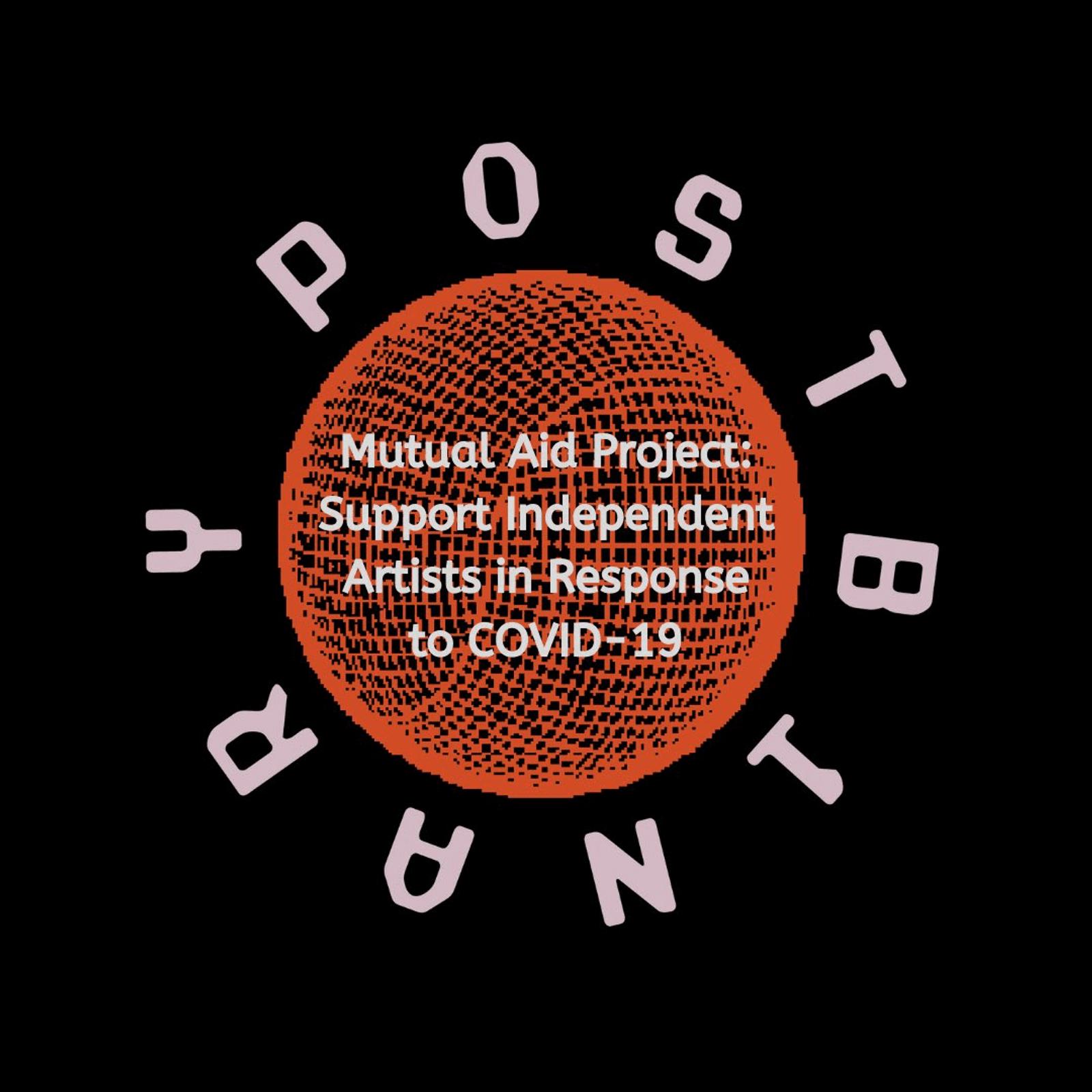
Design by @zewmaggedon (Source: Twitter)
A group of people in the arts also created the incredibly in-depth COVID-19 & Freelance Artists resource page, a list of resources “specifically designed to serve freelance artists, and those interested in supporting the independent artist community.” The page shares resources, opportunities, and financial relief options for artists.
3. Building databases of local restaurants offering delivery and takeout
The hospitality industry is hurting from mandated closures of bars and restaurants, but many restaurants still offer carry-out, curbside pickup, and delivery. Community members have put together databases of local restaurants with takeout and delivery options so that people can support the restaurants they love while social distancing or quarantined.
In Chicago (and 14 other cities), Dining at a Distance uses Airtable to show which restaurants “are open for take-out, curbside pick-up, or delivery during the lockdown of Chicago’s restaurants and bars during COVID-19.” The initial Chicago list was curated by Jennifer G. and Sean L., and includes a form for community members to submit additional restaurants to the list.
Dining at a Distance currently has databases for 15 different cities, including Berlin and Washington, D.C.
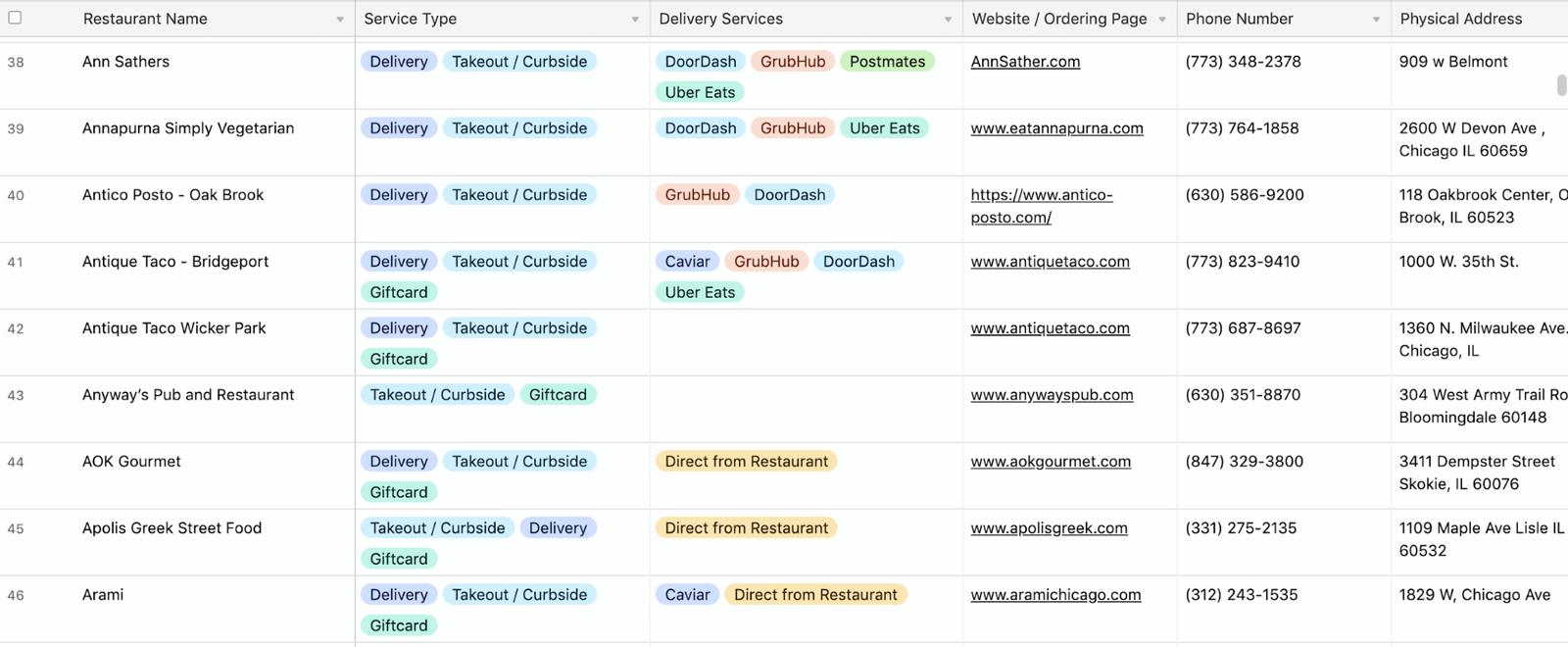
Just a few of the 1300+ restaurants in the Chicago database (Source: Dining at a Distance)
In Ohio, Nick Goers of Company 119 built Socially Distant Eats with the same goal in mind: “to help local restaurants during the COVID-19 crisis.”

Source: Socially Distant Eats
Down Home Seattle has done the same: “This site serves to provide a consolidated list of local restaurants that are offering specials as well as takeout and delivery options for those that choose to dine at home.”
In addition to highlighting restaurants open for takeout and delivery, Down Home Seattle encourages people to buy gift cards to their favorite restaurants.
Added 4/14/2020:
The team at Coast created Takeout COVID, a public service tool that helps restaurants sell their wine, cocktails, beer, and food online. Takeout COVID has launched in 18 cities right now (including Chicago, NYC, SF, Denver, Detroit, Ottawa, Dallas, Nashville, and Austin).
“Restaurants can submit their own listings for free, and from the restaurants we've talked to, they've told us they've seen a small uptick in online orders."
Chicago startup 2ndKitchen launched a new, completely free product to address brewery customers' immediate needs: 2ndKitchen 2Go.
2Go is an online ordering system for breweries, distilleries, and wineries to sell their craft alcohol online through an e-commerce menu portal where customers can order beer & merch, with contactless to-go pickup & home delivery for beer orders.
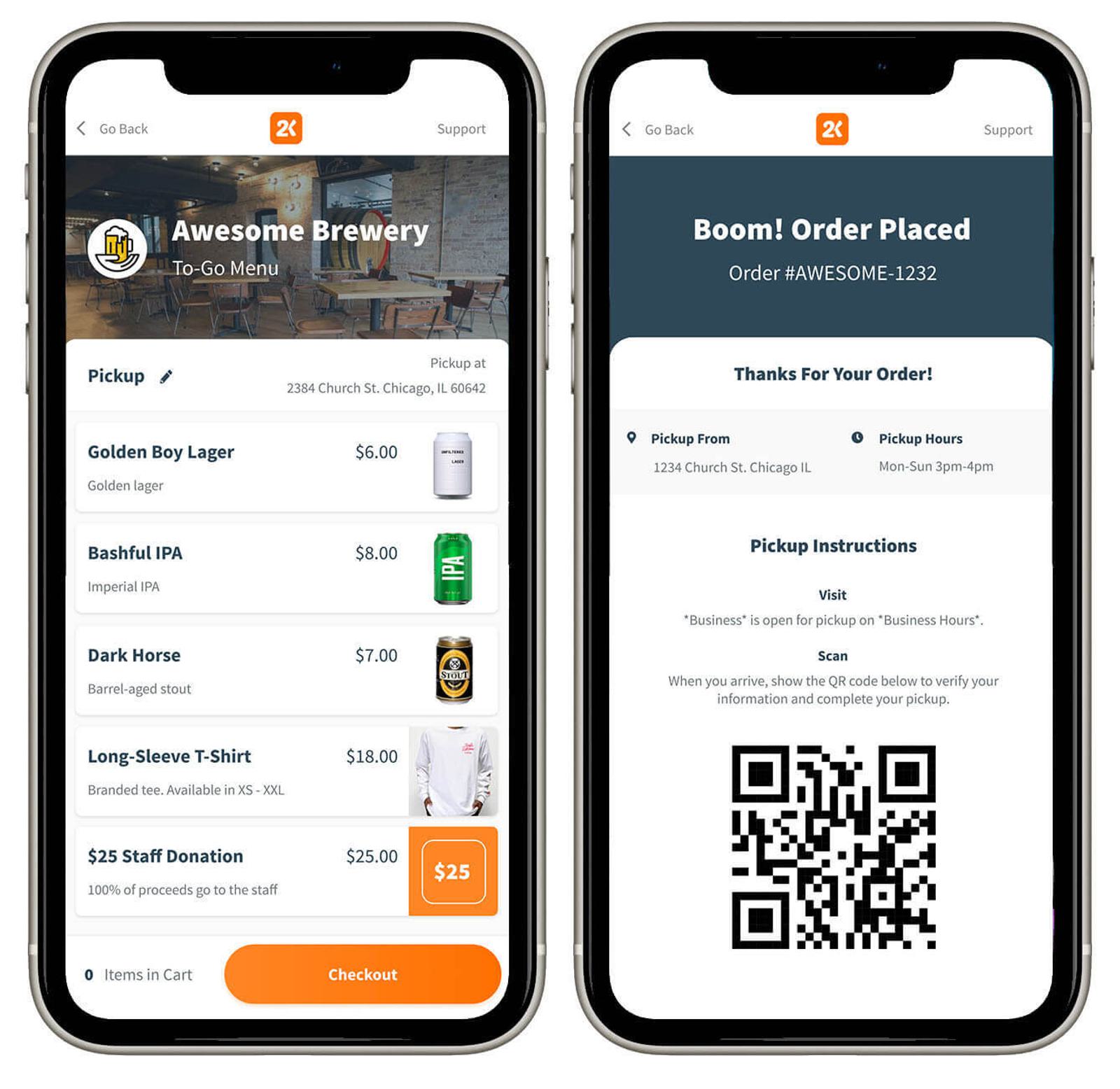
The ordering interface on 2ndKitchen 2Go.
The company also launched 2ndKitchen Residential, a new free software and service for residential buildings. It partners buildings with local restaurants to create a custom on-demand food menu with daily food specials.
2ndKitchen Residential lets apartment complexes and high-rises give residents another option for lunch & dinner without having to venture outside their apartment, keeps residents safe by partnering with trusted restaurants and by minimizing foot traffic from residents entering and leaving the building, and supports struggling community restaurants.
4. Fundraising with cool merch
Stock Mfg. Co. designs and manufactures custom uniforms for bars, restaurants, and hotels — some of the businesses most affected by COVID-19. To support Chicago hospitality workers, they designed this t-shirt:
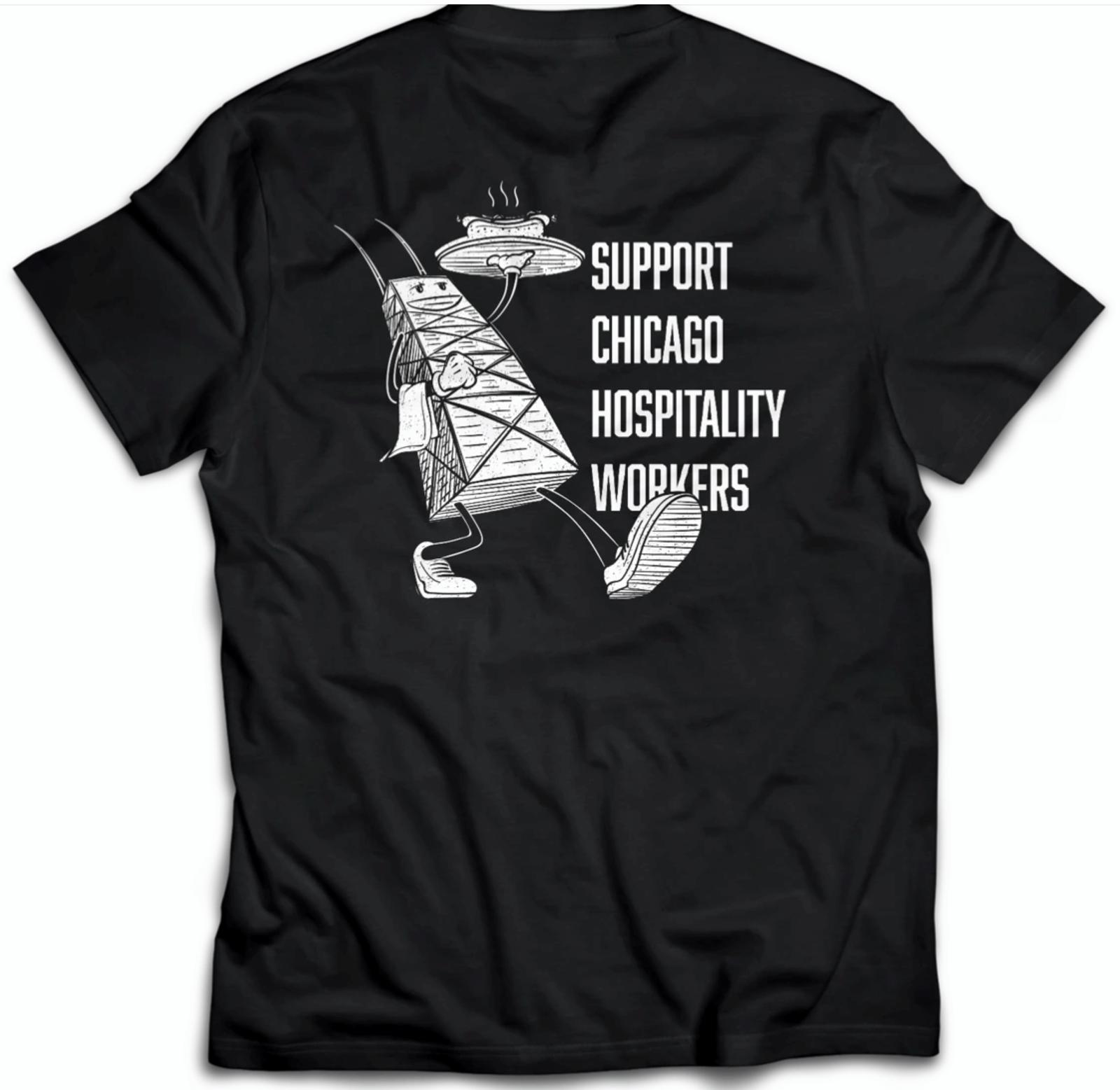
(Source: Stock Mfg. Co.)
“Just as we rely on them to keep Chicago one of the most vibrant dining cities in the world, they rely on us to support them through good times and bad,” the description says. 100% of the net proceeds from the t-shirt will go to financial relief for the hourly employees affected by the hospitality shutdowns.
You can see a full list of supported restaurants and bars (and purchase the t-shirt) here.
5. Sharing what they have
Restaurants are hurting from mandated closures — but they’re still helping their communities:
- Chicago restaurant HaiSous gave out free to-go meals for families and low-wage restaurant workers in Pilsen
- Fat Rice in Chicago offered pre-packaged meals for those in the service industry. With a “pay what you can” model, prices started at $.50/meal online.
- In Indianapolis, restaurants offer free meals for kids, catering for healthcare facilities, and mini food depots with curbside pickup
- Chef José Andrés is transforming several of his D.C. restaurants into “community kitchens” that offer affordable or free to-go lunches for those in need
- In San Diego, restaurants offer free take-out meals to first responders and healthcare workers at the frontlines of the crisis
These are just a few of the hundreds of examples we’ve seen — if you Google “your city’s name + restaurants + free meals + coronavirus,” I bet you’ll find some in your community, too.
6. Volunteering their time
What do people do if they don’t have a restaurant kitchen or the tech-savviness to build a database?
They give what they can — their time.
In Chicago and beyond, people at lower risk are stepping up to support members of their communities who need additional help during this time.
Sofia Armengol created a Google doc for people in the Pilsen neighborhood of Chicago to sign up to grocery shop for their elderly and immunocompromised neighbors. As of March 16, more than 30 Pilsen residents had “shared their names, cross streets, contact information and availability to help via the doc, creating a resource for people in need.”
Chicago organizer Kelly Hayes put together a Chicago COVID-19 Mutual Aid Volunteer Sign-up: “The efforts I am aware of are still in development, but people have been reaching out to volunteer, so I wanted to start getting a list ready so people can be contacted as asks arise.” Her goal is to connect volunteers with groups providing aid to the community so that when opportunities to volunteer come up, there are plenty of people standing by to help.
My Block, My Hood, My City is making and delivering care packages for seniors and people living with disabilities: “My Block My Hood My City will be ensuring seniors have access to hand sanitizer, health supplements, toiletries, and food.”
(Source: My Block, My Hood, My City on YouTube)
In New York, Invisible Hands — started by “Simone, Liam, Mimi, and Healy — healthy 20-somethings in NYC,” — offers “safe, free deliveries for NYC’s most at-risk community members facing COVID-19.” The organization works with healthy volunteers to deliver groceries and supplies to elderly and immunocompromised New Yorkers.
7. Offering free classes on almost everything
Schools and universities across the world have closed, and many parents are facing homeschooling for the first time. Khan Academy put together schedule templates for school closures to help parents and teachers navigate this difficult time:
“As a mission-focused non-profit, it is Khan Academy’s duty to do our part to ensure students keep learning amidst the school closures. We also want to support teachers and parents to the best of our ability as we navigate this crisis together.”
Scholastic also released free daily courses for kids stuck at home during school closures.
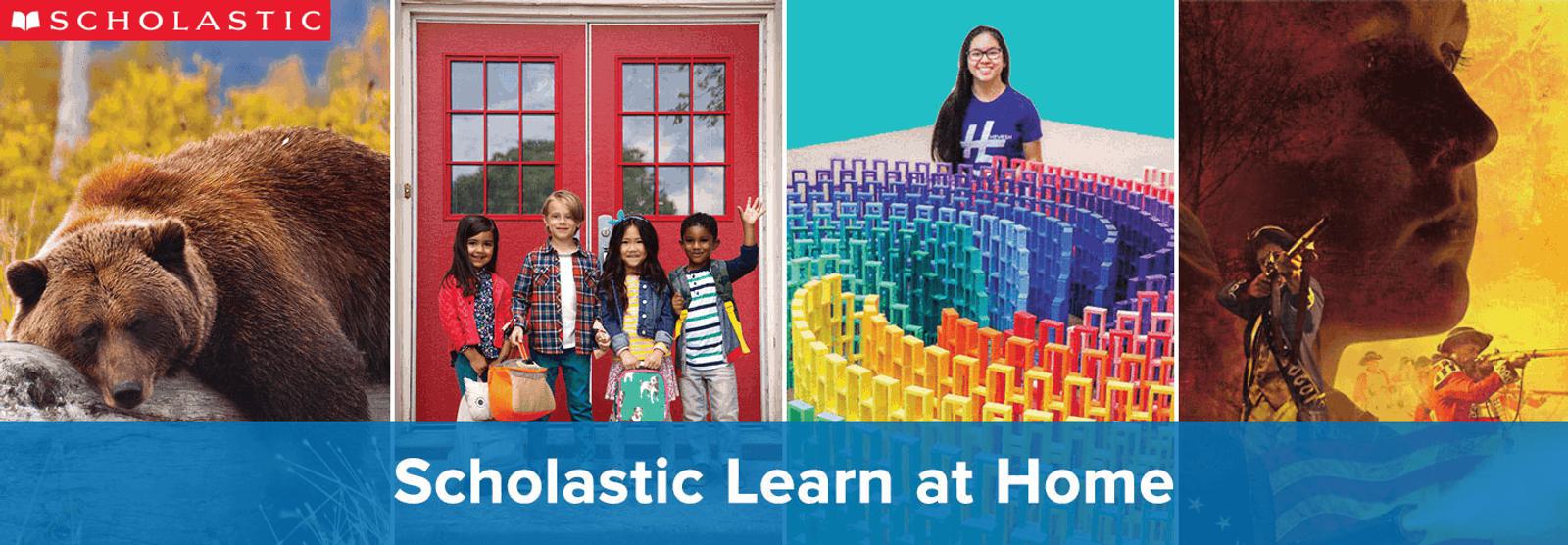
“Day-by-day projects to keep kids reading, thinking, and growing.” (Source: Scholastic)
At-home learning isn’t limited to kids. If there’s something you’ve always wanted to learn, chances are there’s a (free) online class currently available.
Of course, for many people, quarantines don’t mean extra free time (or even staying home — thank you, essential workers, for everything you do for our communities). But for those looking to learn something new — either professionally or for fun — many companies and experts are making online courses and resources free to help you learn.
Here are a few examples of free courses:
- DigitalMarketer is Making Its Lab Membership Free for (at Least) the Month of March For All Businesses and Marketers Impacted By COVID-19 (DigitalMarketer)
- Gucci Osteria’s Massimo Bottura is offering free virtual cooking classes on Instagram (Time Out)
- Down Dog, Pelotón, Core Power Yoga, and more are offering free virtual workout classes — if you have a favorite studio or instructor, chances are they’re offering some kind of virtual option
- Here are 450 Ivy League courses you can take online right now for free (Free Code Camp)
- Ahrefs is offering their “Blogging for Business” course for free
- CXL is offering free CXL Minidegree programs “to people whose livelihoods are affected by COVID-19”
- Stuck at home? Take free drawing classes from famous illustrators (Fast Company)
- 2,500 Museums You Can Now Visit Virtually (Washington Post)
(If you want to create a webinar to share your expertise with the world, ActiveCampaign created a free pack of resources to help you get started.)
8. Making music with and for each other
By now, you’ve probably seen the videos from Italy of people dancing, singing, and playing music on their balconies. (This Twitter thread has some amazing examples.)
Musicians around the world are sharing their music with others to lift spirits and create connections.
From local musicians...
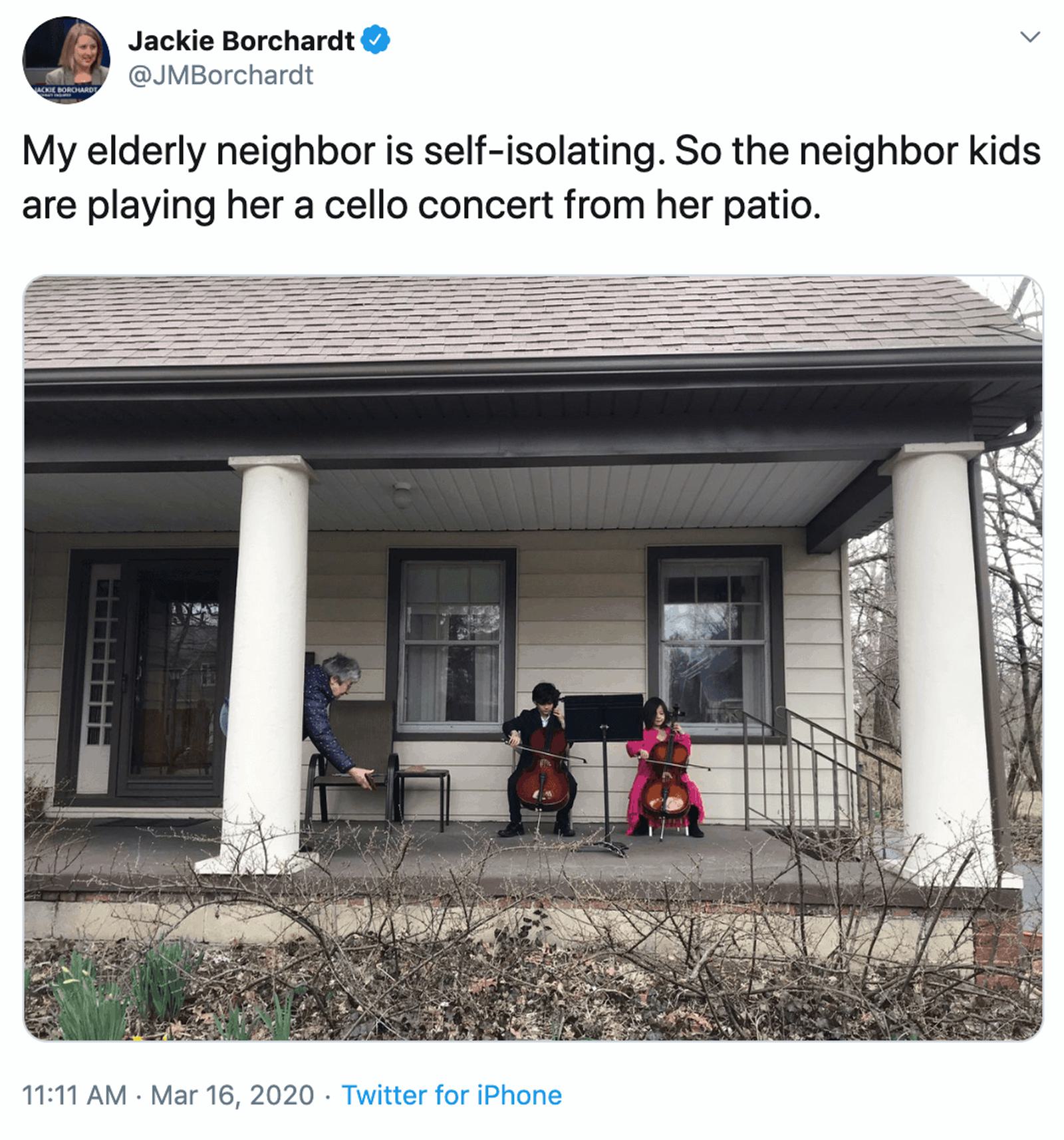
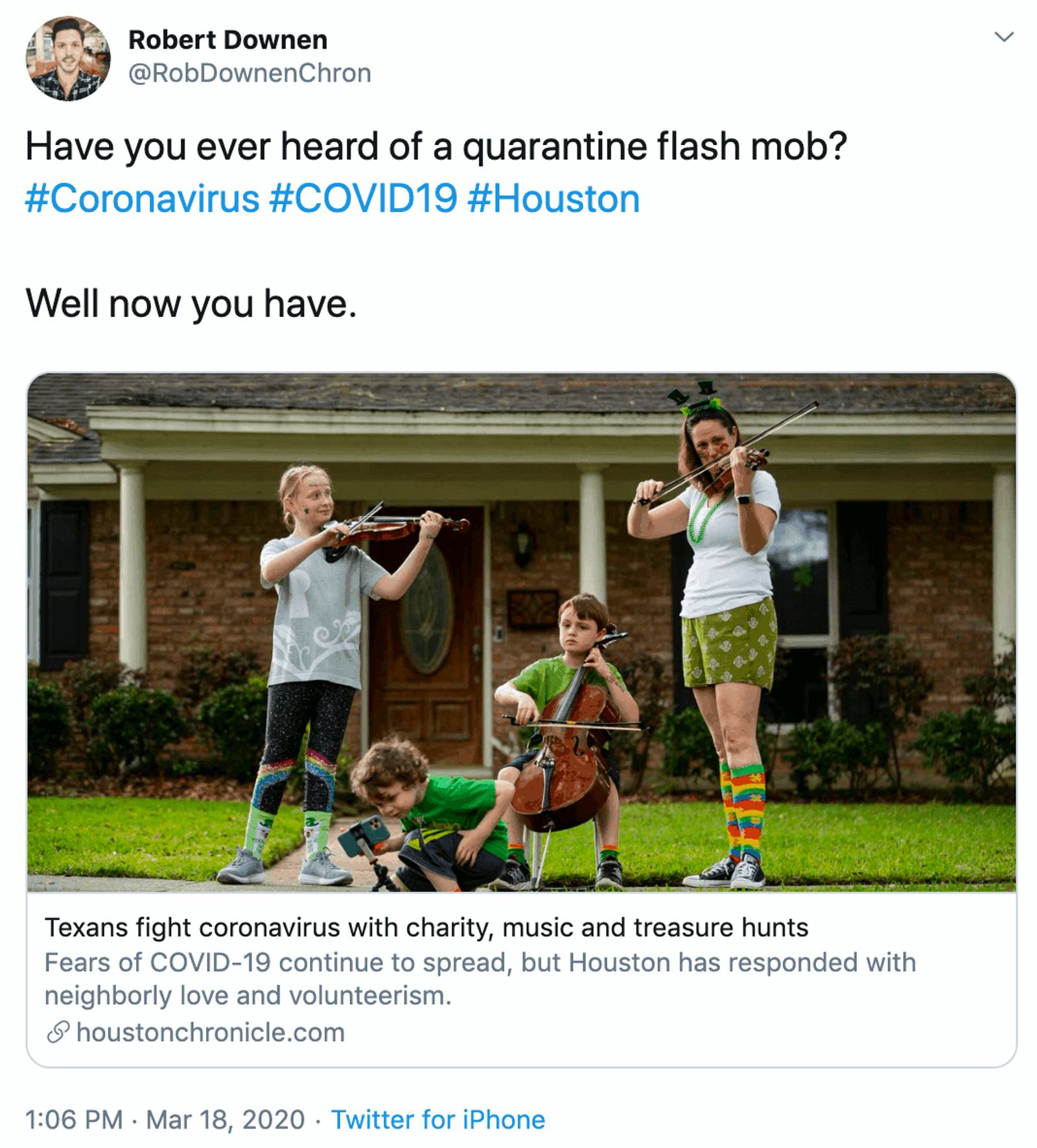
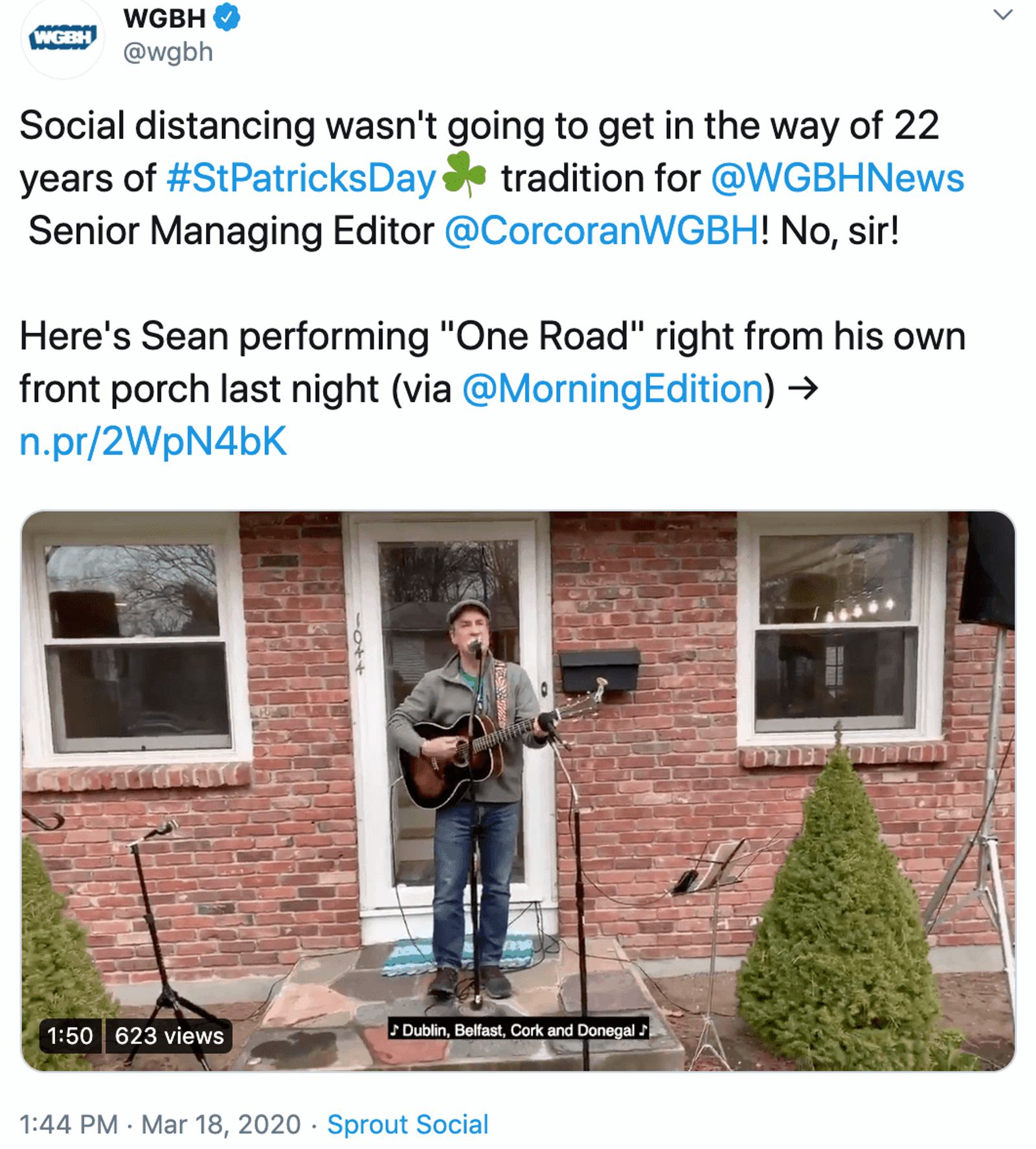
COVID-19 Closes Boston Bars. Irish Singer Performs From His Porch (Source: Twitter)
...to bigger names...
- A List Of Live Virtual Concerts To Watch During The Coronavirus Shutdown (NPR)
- Dropkick Murphys Explain Livestreaming St. Patrick's Day Concert In the Face of Coronavirus (Billboard)
- In a Pandemic, Musicians Play in Empty Halls for Audiences Online (New York Times)
- Virtual Concerts and Broadway Shows to Watch During the Coronavirus Shutdown (The Wrap)
- The Pandemic Is Bringing Opera Lovers Together, at a Safe Distance (Slate)
...people are coming together to create music with and for each other, bringing some joy to a scary, uncertain situation.

